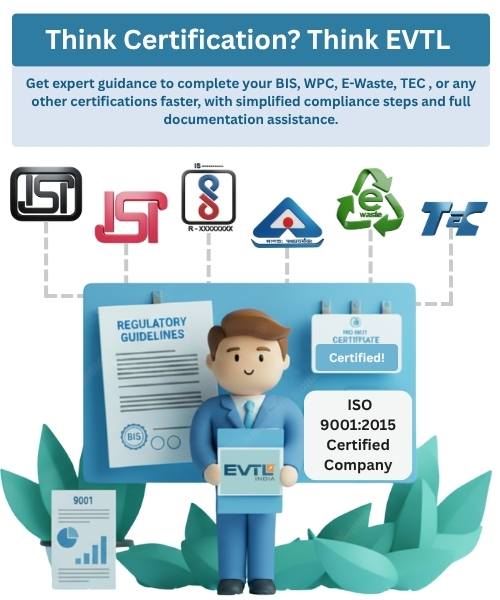Get A Quote
BIS Certification for Hand Tools - Process, Documents, Fees

In the
fast-evolving landscape of Indian manufacturing, quality assurance has taken on
increased significance, especially with the introduction of the Hand Tools
(Quality Control) Order, 2024. This order, issued by the Ministry of Commerce
and Industry on September 17th, 2024, makes it mandatory for manufacturers and
sellers of a wide range of hand tools to obtain BIS (Bureau of Indian Standards)
certification. This move is aimed at ensuring that the quality of hand tools in
the Indian market aligns with the standards required for both safety and
functionality. Let’s dive deeper into what BIS certification means, why it is
essential, and how it affects manufacturers of hand tools like wrenches,
pliers, and pipe tools.
What is BIS Certification?
The Bureau of Indian Standards (BIS) is a national body responsible for setting and maintaining quality standards across various industries in India. Established under the BIS Act, 1986, BIS ensures that products meet specific safety, performance, and quality standards. Manufacturers seeking to sell their products within the Indian market need to get them certified by BIS to bear the ISI (Indian Standards Institute) mark—a symbol of compliance with Indian standards.
For hand tools like chain pipe wrenches, open-ended slugging wrenches, ring slugging wrenches, adjustable wrenches, open-jaw wrenches, ring wrenches, pipe wrenches (both general and heavy-duty), and combination side cutting pliers, BIS certification ensures that these tools meet stringent quality control measures. This certification is not only a legal requirement but also a marker of trust, allowing consumers and businesses to make informed purchases.
The Hand Tools (Quality Control) Order, 2024
The Hand Tools (Quality Control) Order, 2024, is a pivotal step by the Indian government to regulate the hand tools industry. As of September 17, 2024, it mandates that certain categories of hand tools must comply with the relevant Indian Standards, making BIS certification compulsory for their manufacture and sale. The Indian Standards for hand tools, which the BIS certification process relies on, are comprehensive and cover various technical aspects, such as material composition, design specifications, performance benchmarks, and safety criteria. The tools specified under this order include:
Each tool type must meet the specific guidelines set forth in these standards to qualify for BIS certification. These tools are widely used across various industries such as construction, automotive repair, plumbing, and electrical works, and they play a crucial role in maintaining operational efficiency. By ensuring that these tools conform to BIS standards, the government is striving to enhance the safety, durability, and overall performance of the products available in the Indian market.
Benefits of BIS Certification
The
implementation of mandatory BIS certification For Hand Tools serves several key purposes:
1. Ensuring Product Safety: Hand tools are often subjected to high levels of stress, particularly in industrial and heavy-duty applications. By complying with BIS standards, manufacturers can ensure that their tools can withstand extreme conditions without compromising the safety of the user.
2. Guaranteeing Quality: The ISI mark, which is awarded only after a product has been thoroughly tested against BIS standards, is a sign of guaranteed quality. For manufacturers, this translates into improved customer satisfaction and reduced product recalls or complaints.
3. Legal Compliance: Under the Hand Tools (Quality Control) Order, 2024, any manufacturer who fails to obtain BIS certification before selling or distributing their tools in India could face severe legal consequences, including fines, imprisonment, or both. Hence, adhering to the BIS guidelines is not just about ensuring quality but also about staying on the right side of the law.
4. Competitive Advantage: In a market where quality-conscious consumers are increasingly selective, products bearing the ISI mark stand out. BIS certification can offer a competitive edge by signaling that a tool is not only reliable but also meets the highest national quality standards.
Process for BIS Certification
The BIS
certification process for Hand Tools involves multiple
steps, designed to thoroughly evaluate a product's compliance with the required
standards. Here is a general overview of the certification process:
1. Application Submission: Manufacturers
must submit an application form along with required documentation to BIS.
2. Documentation Review: BIS reviews the
submitted documents to ensure completeness and correctness.
3. Factory Inspection: BIS officials
conduct an on-site inspection of the manufacturing facility to assess the
production process and quality control measures.
4. Sample Testing: Product samples are
taken and tested in BIS-approved laboratories to verify compliance with Indian
standards.
5. Certification Grant: Upon successful
completion of the inspection and testing, BIS grants certification, allowing
the manufacturer to use the BIS mark on their products.
Documents
Required for BIS Certification
To apply for BIS
certification For Hand Tools, manufacturers need to submit the following documents:
● Application form
● Manufacturing process details
● Quality control plan
● Test reports from BIS-approved
laboratories
● Factory layout and equipment
details
● Proof of business registration
● Product specifications and
technical details
● Declaration of conformity to
Indian standards
Additionally,
manufacturers may be required to provide proof of compliance with environmental
and safety regulations, depending on the specific type of product being
certified.
Consequences
of Non-Compliance
Manufacturers who fail to comply with the Hand Tools (Quality Control) Order, 2024, face significant legal repercussions. Penalties for non-compliance can include:
●Fines: Non-compliant manufacturers may face monetary penalties, depending on the extent of the violation.
●Imprisonment: In extreme cases, especially where the violation poses a risk to public safety, imprisonment may be imposed.
● Market Withdrawal: Products that do not bear the ISI mark or fail to meet BIS standards may be banned from the market, leading to loss of revenue and reputational damage.
Given these
potential consequences, it is critical for manufacturers to start the
certification process early and ensure that their products meet the necessary
standards before the order comes into full effect.
Challenges for Manufacturers
For manufacturers new to the process, obtaining BIS certification might seem challenging, especially in terms of meeting the stringent quality standards required. The cost of testing, factory upgrades, and compliance could be an initial hurdle, particularly for smaller players in the industry. However, these challenges are outweighed by the long-term benefits, including improved product reliability, reduced warranty claims, and enhanced brand reputation.
Additionally, with the deadline for compliance now in place, manufacturers who delay in obtaining certification risk facing interruptions in their supply chains, as uncertified products will not be legally permitted for sale.
Conclusion
The BIS certification for hand tools as mandated by the Hand Tools (Quality Control) Order, 2024, marks a crucial step towards standardizing quality across the Indian hand tool industry. For manufacturers, this presents both a challenge and an opportunity. While compliance requires investment in testing and factory upgrades, it also offers the potential to enhance product quality, build consumer trust, and gain a competitive edge in a crowded market.
For consumers and industries that rely on these tools, the implementation of BIS certification ensures that they are investing in products that are safe, durable, and up to the mark. As the deadline for compliance approaches, it is essential for manufacturers to embrace this opportunity to elevate the quality of their offerings and ensure they remain compliant with national standards.
Navigating the BIS certification
process can be challenging, especially for small and medium-sized enterprises.
EVTL India is a leading consultancy firm dedicated to assisting manufacturers
in obtaining BIS certification (ISI Mark) efficiently. With expertise in
managing BIS portal submissions, documentation, and regulatory fees, EVTL India
ensures a smooth and successful certification process. By choosing EVTL India,
manufacturers can enhance their product's marketability both in India and
internationally, securing a competitive edge. Additionally, EVTL India provides
ongoing support post-certification, helping manufacturers maintain compliance
with BIS standards and renew their licenses as needed.
You can contact us via email at contact@evtlindia.com or by phone at 9560935898. Feel free to get in touch with us anytime for the support you need.
BIS ISI Mark Certification | BIS-CRS Certification | EPR E-WASTE | WMI Registration | BIS Certification For Footwear | TAC & IMEI Registration | BIS FMCS Page | TEC | EPR Registration for Plastic Waste Management | EPR Registration for Battery Waste Management | EPR Registration For Used Oil | EPR Registration for Tyre Waste Management | WPC ETA License | NOC | LMPC | Legal Metrology | Trademark Registration | ISO Certification | EMI-EMC Test | Toys | GEM Registration | EPCG Scheme | LM 79 & LM 80 | ROHS Approval | CDSCO Registration | RF Testing | IP Rating Test | MSME & NSIC Registration | BIS Certificate for Conformity | BIS Scheme-X Certification | Hallmark Registration | Laboratory Recognition Scheme | ECO-MARK Certification | RDSO | CE Certification | List Of Equipments | US FDA Registration | Lab Setup & Lab Equipment |
Free Call Back
Why Choose EVTL INDIA
Expertise in Indian Regulatory Standards
End-to-End Support
Trusted by Top Indian & Global Brands
Fast Processing & Transparent Pricing
Strong Liaison with Indian Authorities
Company Profile



















